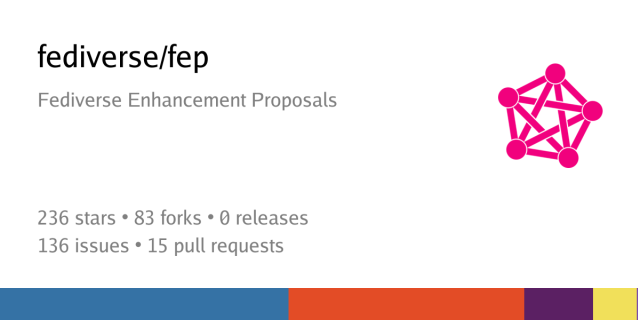How Hubzilla 10.6 b0rked its own forums
Just because it works under your very limited and controlled lab conditions, doesn't mean it will work just as well under real-life conditions.
A few may remember the summer of 2024 when (streams) rolled out FEP-171b. It broke federation in every imaginable way because, as it turned out later, (streams) suddenly confused the many different IDs it had to juggle. Granted, the byproduct of trying to fix this was Forte, the first Fediverse server software to provide nomadic identity via nothing but ActivityPub.
Now Hubzilla rolled out FEP-e232. And there's breakage again. Not quite as badly, but in places that really hurt.
So the talk of the town in the Fediverse is Mastodon 4.5 introducing quote-posts. (Mastodon 4.5 allegedly introducing quote-posts to the Fediverse, and how that's wrong, is another story.)
Interestingly, almost at the same time, Hubzilla 10.6 was rolled out. Money quote from the announcement:
- Implement FEP-e232 (object links) for quote posts
FEP-e232 Object Links in practice usually = "quote-posts like Misskey" = linking to the original with "RE:" before the link.
Apparently, rather than what Hubzilla had been doing since 2012 when it was still Red. What Friendica has been doing since its own inception in 2010. Namely insert a dumb copy of the quoted post into the quoting post.
While (streams) and Forte have been supporting FEP-e232 under the bonnet for quite a while while still quote-posting with dumb copies, Hubzilla has decided to go all the way and replace the old-fashioned Friendica way of quote-posting entirely with the Misskey way that's all the rage in the Fediverse now.
Yes, this has its advantages. If the original is edited, then the edit (in theory) is reflected in all posts that quote-post it.
But here on Hubzilla, this switch causes trouble.
Mastodon rolled out rendering support for Misskey-style quote-posts before rolling out quote-posts themselves, so those Mastodon servers that can't render these quote-posts are hopelessly outdated.
Hubzilla, on the other hand, rolled out Misskey-style quote-posts with version 10.6 while 10.4 and older can't even render Misskey-style quote-posts, not even when they come straight from a *key. In this regard, it would have been smarter to first make sure that Hubzilla renders this kind of quote-posts, then wait for a few minor releases and then change the way Hubzilla quote-posts.
You may see this as just a minor nuisance. But on top of that, it breaks Hubzilla's forums.
See, Hubzilla's forums are based on quote-posts. You start a new thread by DM'ing to a forum, and the forum will automatically share (quote-post) your start post to all forum members. If it's a private, limited-access forum, only the forum members are permitted to see the post with your quoted post in it.
I guess it's kind of obvious that this can only work by quote-posting a dumb copy of the start post unless a few more stops are being pulled.
Now, however, forums on Hubzilla 10.6 quote-post start posts by linking to the original. Remember that the original is a DM to the forum. As in only the forum is permitted to see it. You can click the link to the original all you want. But unless you run the forum, Hubzilla will not let you see it, not even with all the OpenWebAuth magic sign-on that you have on yourself as a Hubzilla user. In fact, I'd be very worried if I could see it now.
If there was even only one active forum on one of the two public hubs that run development versions, this critical bug would have popped up earlier and been fixed before it would have hit a release. But apparently, nobody is crazy enough to run a forum on a dev-grade hub, not to mention how few active Hubzilla forums there are in the first place. Seriously, I wonder if there's any feedback coming from the two dev hubs because I never see any hit the Support Forum. Does it all go straight to Framagit?
Good thing hubzilla.org is still running Hubzilla 10.4. hubzilla.org is not only the official Hubzilla website, it's actually a Hubzilla hub itself. The official Hubzilla website is built on a Hubzilla channel, using the Webpages app. And hubzilla.org is home of the Hubzilla Support Forum. It would have been a disaster, had this forum been broken, too.
I guess there's a hotfix due now, even if it means reverting FEP-e232 support (although changing the permissions of a DM to a forum channel would do the trick, and looking at how (streams) and Forte do it would be even smarter). And I hope it'll come before hubzilla.org is upgraded to 10.6.
By the way, while it's at it, maybe Hubzilla could also permanently set that GoToSocial/Mastodon flag that allows being quote-posted. I mean, if you come to a place that has been able to quote-post for a whopping 13 years, that can quote-post any public content from anywhere in the Fediverse with zero resistance, and that has no control over whether or not your stuff can be quote-posted (other than not posting in public), it's safe to assume that you're okay with your stuff being quote-posted anyway.
#Long #LongPost #CWLong #CWLongPost #FediMeta #FediverseMeta #CWFediMeta #CWFediverseMeta #Mastodon #Misskey #GoToSocial #Friendica #Hubzilla #Streams #(streams) #Forte #Forums #Groups #FediverseGroups #FediGroups #FEP_e232



